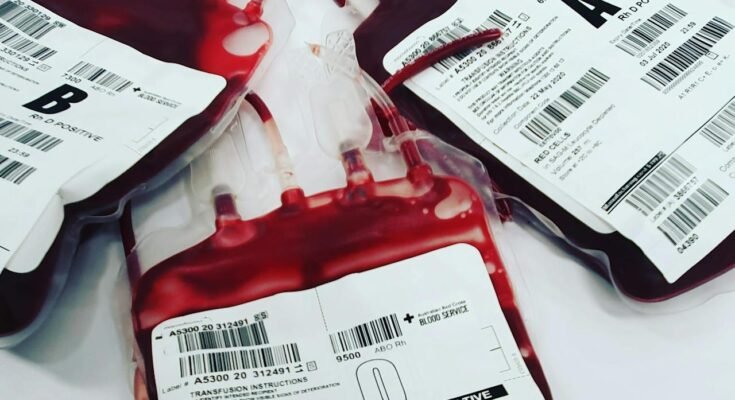Blood and its classification into different types give rise to the two fundamental definitions that imply the most in human blood, one classification dealing with blood typing and the other with a very large number of functions that keep a person alive, such as oxygen and nutrient transport, waste product elimination, and defense against infections. Blood types not only decide compatibility during blood transfusion but may also play an important role in general health as well as susceptibility to diseases
ABO Blood Group System
The ABO blood group system is the most common and widely accepted method of classifying human blood. The classification of blood depends on the presence or absence of certain antigens which occur on the red blood cells’ surface. There are four fundamental blood groups in this system:
- Type A: Blood cells have A-type antigens on their surface; in their plasma, however, anti-B antibodies are present.
- Type B: Blood cells have B-type antigens that are present with the secreted anti-A antibodies
- Type AB: Five blood type antigens are A and B. This group has no anti-A or anti-B antibodies in their plasma. It is termed as universal recipient type, since persons with the AB blood group could receive blood from any other ABO type
- Type O: No A or B antigens are present on red blood cells. The plasma has both anti-A andanti-B antibodies. This is termed as universal donor type, because O-negative people can donate blood to any ABO blood type.
Very distinctly based on compatibility between donors and recipients, efficient blood transfusions are gene of water. If a recipient, however, receives the wrong blood transfusion from a donor, the recipient’s immune system may react, leading to serious complications such as hemolysis (the destruction of red blood cells).
The Rh Factor
In addition to the ABO blood group system, the Rh factor represents another essential component of blood classification. The Rh factor is a protein that may or may not be present on the surface of red blood cells. If it is present, the blood type is called Rh-positive (for example, A+, B+, AB+, O+). If it is absent, it becomes Rh-negative (for example, A-, B-, AB-, O-).
The Rh factor occupies a distinct position in pregnancy. When an Rh-negative woman is to give birth to an Rh-positive child, it can cause Rh incompatibility. The mother’s immune system may create antibodies against the Rh-positive cells that may lead to a sickness called hemolytic disease of the newborn. Fortunately, Rh immunoglobulin (RhIg) prevents this disease by blocking the mother from producing antibodies against her Rh-positive child.
The Role of Blood Groups in Health
Besides transfusions and pregnancy, blood group may also affect some health conditions. Current studies suggest that an individual’s susceptibility to certain diseases, infections, and even responses to various medications may indeed be affected by their blood type.
1:Heart Disease: There is an indication from some studies that people with type A blood have a higher probability of developing heart diseases than their type O counterparts; however, more research is called for to understand these associations. 2.Cancer: It is demonstrated that blood group could influence the risk of developing certain types of cancer. For instance, with type A, an individual may have a greater risk through risk modulation for gastric cancer. Also, there are indications that people with type O blood may stand a lesser likelihood of contracting pancreatic cancer 3.Infections: Also, susceptibility to some infections might depend on blood type. For instance, individuals with blood group type O may be less susceptible to a malaria infection, whereas types A and B may be more susceptible than type O, particularly in cases of infections with Helicobacter pylori strains associated with ulcer disease. 4.Immune Response: Similarly, blood group may also play a big role in the body’s immune response. Some studies have indicated that type O people might be better measured with a good immune system against several viral agents, but with the development of type A, autoimmune illness may develop more easily.
Blood Type and Diet
There have been numerous debates regarding the relationship between blood type and diet. The controversial “Eat Right for Your Type” diet, popularized by naturopathic physician Dr. Peter D’Adamo, recommends that one tailor his or her own diet to his or her blood type to achieve better health results and weight control. According to this theory:
- Blood type O people should follow a high-protein diet of lean meats, fish, and vegetables.
- Blood type A people are recommended to follow a strict vegetarian diet consisting of plant-based foods.
- Blood type B people should be balanced with meat, dairy, and vegetables.
- Blood type AB people should have a mixed diet that consists of food from both animal and plant sources
In nonetheless, it should be noted that the direct influence of blood type on one’s dietary needs and health outcomes is unreasonably supported by scientific evidence.
Conclusion
Thus, blood types play a very significant role in human health, especially during blood transfusions and pregnancies. Although the importance of blood transfusions and classification with respect to the Rh and ABO systems is emphasized more during medical procedures, blood typing could have its broader aspects that allow it to pose either a risk or protective effect against the diseases and variations in immune response. Knowing the blood type is particularly useful for medical reasons, as there is a lot of ongoing research in the field looking into the fascinating connections between blood type and general health.
As we gain further insight into the complex ways our genetic make-up impacts health, it is essential we take a far more scientific view on blood types and use evidence-based research to guide our health decisions.



